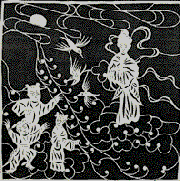 To Celebrate and to Pray ---- Chinese Valentine's Day Customs
To Celebrate and to Pray ---- Chinese Valentine's Day Customs
The double seventh is the only Chinese festival devoted to love in the Lunar calendar. Actually, in ancient China, Qixi was not only a special day for lovers, but also for girls. As early as the Han Dynasty (206BC-220AD), girls began to celebrate Double Seven Festival in China. What was behind their celebration was their desire for the mastery of knitting, cooking, and home making, each of which was a must to be a fair lady at that time. As a result, girls would make tables, light candles, and present fruits in their courtyard in the hope of being blessed with these skills from the Weaving Maid. So the festival is also known as the "Begging for Needlecrafts Festival" or "Daughters' Festival." Although later the festival became associated with a love story, these activities survived.
 1. Needlework
1. Needlework
A girl will be more attractive to a suitor if she has talents of one kind or another in addition to being beautiful. In the old days of China, needlework was necessary as part of a girl's dowry. Since the Weaving Maid is also an excellent seamstress, on the double seventh in ancient China, girls would hold weaving and needlework competitions to see who had the best hands and the brightest mind, both prerequisites for making a good wife and mother at that time. Just imagine, against the blue sky where the bright moon smiles, a pretty girl would thread the needle deftly…
2. Blossoms
The methods of keeping the skin fair and glowing by using blossoms have never been a secret to Chinese girls. On the double seventh, girls would put blossoms into a copper basin of water. The water, which would absorbe the essence of the blossoms, was said to be good to girls' skin when they washed their face.
3. Singing
On the double seventh, girls would not forget to gather and sing a song called Qiqiao (Begging for Needlecrafts). The song expressed their sweet wishes of longevity for their parents and firm friendship for their "sisters."
4. The Maid "Shrine"
Girls would also put up colorful "shrines" made of paper, fresh fruit, flowers, and incense as a tribute to the Weaving Maid and the cowherd. In some parts of Shandong Province (in East China), young women offered fruit and pastries to pray for a bright mind. If spiders were seen weaving webs on sacrificial objects, it was believed the Weaving Maid was giving a positive reply to the prayers.
